Moving to Queensland
Moving to a new state can be an exciting and daunting experience. Queensland, being such a large state, with its sunny beaches, tropical weather, and laid-back lifestyle, is a popular destination for those looking for a change of scenery. However, moving to a new state comes with its own set of challenges and considerations.
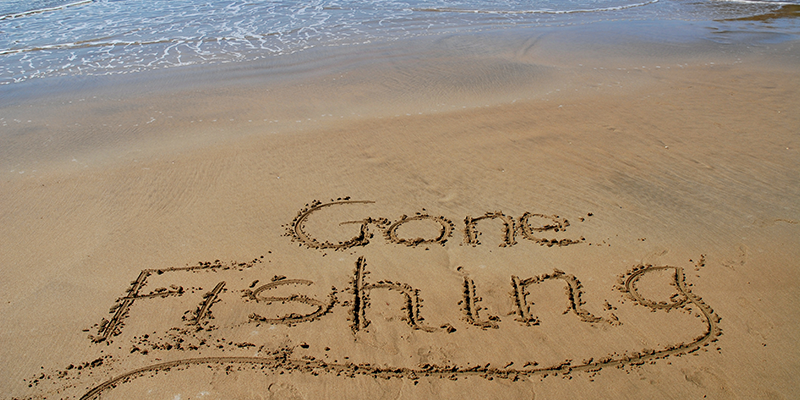
Key takeaways
- Queensland is Australia's second-largest state, with a population of over 5 million people.
- The state's capital, Brisbane, is home to over 2.5 million people and is Australia's third-largest city.
- Queensland is known for its sunny beaches, tropical climate, and laid-back lifestyle, making it a popular relocation destination.
- Major cities include Brisbane, Gold Coast, Sunshine Coast, Townsville, and Cairns, each offering distinct lifestyles and job opportunities.
- The state has a diverse population, with significant communities from the UK, New Zealand, and India.
- Queensland's median age is 38.2 years, with a notable indigenous population of over 4%.
- The state offers a variety of living environments, from coastal cities to outback towns and tropical north regions.
- Housing prices can vary significantly, with desirable coastal areas being more expensive.
- The Great Southeast region includes major business centers and offers numerous outdoor recreational opportunities.
- Moving to Queensland involves considering factors such as climate, job market, housing affordability, and lifestyle preferences.
All you need to know about moving to the biggest state on the East Coast
In this blog article, we will explore some of the pros and cons of moving to Queensland from interstate. We'll cover everything from the climate and lifestyle to housing prices and job opportunities, to help you make an informed decision about whether moving to Queensland is the right choice for you. So, whether you're considering a sea change or a tree change, we give you all the information.
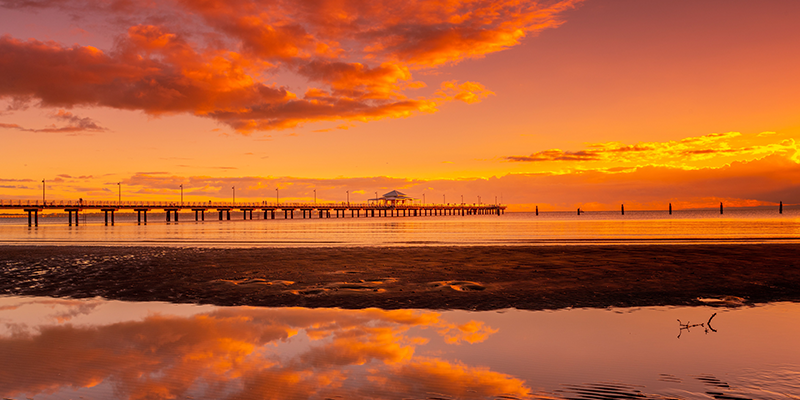
Sunrise over Moreton Bay
Quicklink jump menu:
The state of Queensland - Major Cities and Towns | The Great Southeast | The Queensland Coast | The Queensland Country | The Queensland Outback | Up North | Finding a home in Queensland | The cost of buying in the Southeast corner | Costs of moving to Queensland from ... | How to get to Queensland | How to move to Queensland - a checklist | Working and Livigng in Queensland | Cost of living in Queensland | Explore Queensland | The weather in Queensland | Pet Relocations | Need storage in Queensland?
Queensland at a glance
Queensland, Australia's second-largest of the Australian states geographically, is home to a diverse population of over 5 million people. According to the 2022 Australian census results from the Australian Bureau of Statistics, Queensland has a relatively young population, with a median age of 38.2 years. The state is culturally diverse, with over a quarter of its population born overseas. The largest migrant communities are from the United Kingdom, New Zealand, and India. Queensland is also home to a significant Indigenous population, with over 4% of residents identifying as Aboriginal or Torres Strait Islander. The state's capital is in south east Queensland, Brisbane, is the largest city in Queensland and is home to over 2.5 million people, making it the third-largest city in Australia. Queensland's population is growing rapidly, with many people drawn to the state's warm climate, relaxed lifestyle, and stunning natural beauty.
2021 AUSTRALIAN BUREAU OF STATISTICS CENSUS STATS
The demographics:
| Population | 5,156,138 |
| Median age | 38 |
| Number of families | 1,366,657 |
| Number of daily commuters | 1,697,742 |
| Number of private dwellings | 2,190,424 |
| Average number of motor vehicles per dwelling | 1.9 |
| Median weekly household income | $1,675 |
| Median weekly personal income | $787 |
| Total people attending educational institutions (preschool to tertiary) | 1,197,671 |
The State of Queensland – Major Cities and Towns
Meanjin (known by its European name Brisbane), the capital city of Queensland, is a popular destination for those looking to move to the state and is just north of the New South Wales border. The city is largely defined by the mouth of the Brisbane River (east) and Mt Coot tha (west), and boasts a vibrant cultural scene, excellent dining options, and a subtropical climate. It's also home to several universities, making it a popular destination for students. However, Brisbane's popularity comes with a higher cost of living compared to other cities and towns in Queensland. Housing prices can be quite steep, and traffic can be heavy during peak hours.
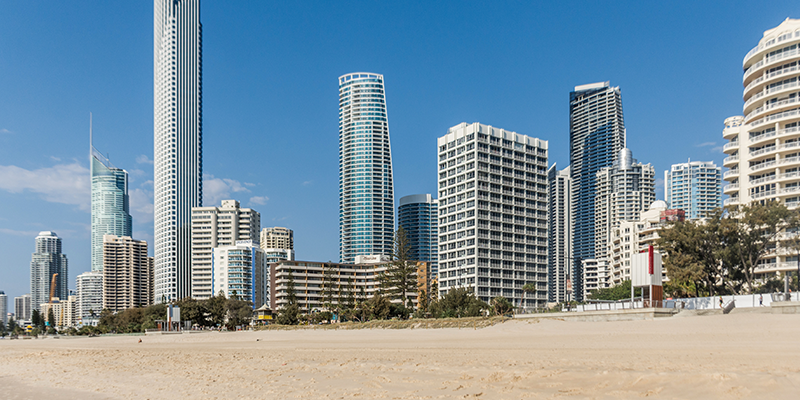
The city meets the sand at the Gold Coast
The Gold Coast is another popular destination, particularly for those looking for a beach lifestyle. The city is famous for its stunning coastline, and there are plenty of opportunities for surfing, swimming, and other water-based activities. The Gold Coast also boasts a lively nightlife scene, with plenty of bars, clubs, and restaurants to choose from. However, like Brisbane, the Gold Coast can be expensive, and finding affordable housing close to the beach can be challenging. Traffic can also be an issue, particularly during the busy tourist season.
The Sunshine Coast is another popular destination for those looking to move to Queensland. The region boasts stunning beaches, a relaxed lifestyle, and a growing business community. However, like the Gold Coast, housing prices can be high, particularly in desirable beachside suburbs. The region can also be prone to bushfires during the hot, dry summer months.
Townsville, located in northern Queensland, is a more affordable option than Brisbane or the Gold Coast. It's a regional hub with a thriving business community and plenty of job opportunities. The city is home to James Cook University and a major hospital, making it a popular destination for students and healthcare professionals. Townsville is also close to some of Queensland's best natural attractions, such as Magnetic Island and the Great Barrier Reef. However, the tropical climate can be hot and humid, and the city is prone to cyclones during the wet season.
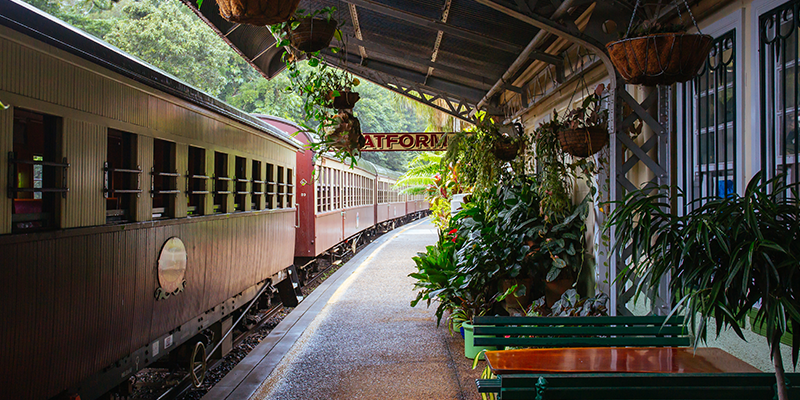
The famous Kuranda rainforest train is iconic to the Cairns region
Experience living in the tropical paradise of Cairns in far north Queensland. Known for its stunning natural beauty, tropical climate and easy access to the Great Barrier Reef. However, keep in mind that the wet season brings cyclones, and beachside living comes at a premium cost. With a competitive job market, especially for professionals, make sure you're well-prepared for your next adventure in this vibrant city.
Mount Isa, located in the heart of the outback, offers a unique lifestyle that is different from many other towns and cities in Queensland. The town has a rich cultural heritage, with a significant indigenous population and a strong sense of community. Mount Isa hosts a range of cultural events throughout the year, celebrating the town's diversity and history. Additionally, the surrounding landscape is stunning, with picturesque gorges, creeks and waterholes offering a range of outdoor activities such as hiking, camping, and fishing. Despite its remote location, Mount Isa has excellent transport links and is easily accessible by road, rail, and air.
Longreach is a hidden gem of the Queensland outback and is a vibrant town steeped in history and boasts a rich cultural significance that is sure to captivate you. Immerse yourself in the local museums and heritage sites, such as the Australian Stockman's Hall of Fame and the Qantas Founders Museum, and discover the secrets of Australia's rural and outback lifestyle. Experience a relaxed pace of life and enjoy the beauty of the surrounding countryside. Despite its remote location, Longreach offers excellent amenities, including healthcare facilities, shopping centres, and restaurants, making it a great place to call home.
The Great Southeast
Moving from interstate to the south and southeast corner of Queensland can offer a fantastic lifestyle change for those seeking warm weather, a laid-back lifestyle, and a thriving business community. The region includes the local government areas of Brisbane, Gold Coast, Ipswich, Lockyer Valley, Logan City, Moreton Bay (home of the beautiful Glass House Mountains), Noosa, Redlands, Scenic Rim, Somerset, Sunny Coast, and Toowoomba.
One of the main advantages of living in the southeast corner of Queensland is its proximity to major business centres. Brisbane is a hub for business and industry, offering a wide range of job opportunities across a variety of sectors. The region is also home to several universities.
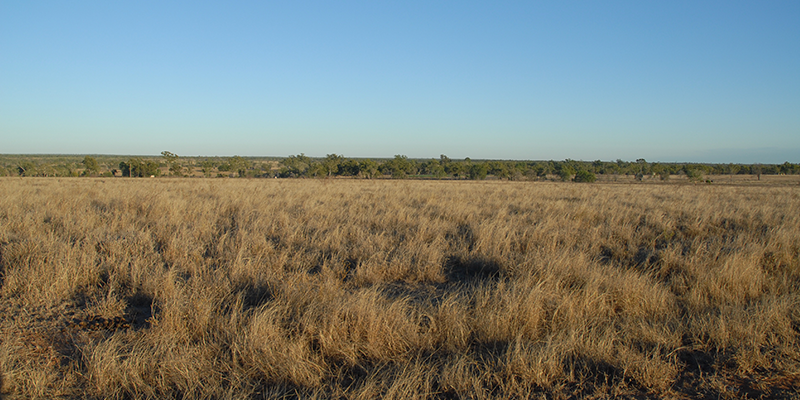
The Queensland outback is vast
The southeast corner of Queensland is also renowned for its stunning natural beauty, with plenty of opportunities for outdoor recreation. The region boasts numerous national parks, including the Lamington National Park and Springbrook, which offer breathtaking scenery and a chance to get up close with native wildlife. The Gold Coast is also home to world-famous beaches, and there are plenty of opportunities for water-based activities such as surfing, swimming, and boating.
However, living in the southeast corner of Queensland can be expensive, particularly in desirable suburbs and towns close to the coast. Housing prices can be high, and traffic can be heavy during peak hours. The climate can also be a challenge, with hot summers and high humidity levels.
Despite these challenges, many people find that the benefits of living in the southeast corner of Queensland outweigh the drawbacks. The region offers a fantastic lifestyle change, with warm weather, stunning natural beauty, and a relaxed, laid-back atmosphere. If you're looking to start a new career, enjoy the outdoors, or simply enjoy the good life, the southeast corner of Queensland is a good start for those looking to make a move from interstate.
The Queensland Coast
Moving from interstate to the many coastal towns along the Queensland coast offers a fantastic opportunity for those seeking a relaxed, beachside lifestyle. With so many towns to choose from, there is a wide range of lifestyle options available to suit different tastes and budgets.
Noosa Heads is a popular destination for those seeking a laid-back beach lifestyle. The town is located on the Sunshine Coast and is known for its stunning beaches, world-class dining scene, and boutique shopping. The town is also home to several national parks and nature reserves, offering ample opportunities for outdoor recreation.
Mackay is another popular coastal town, located in central Queensland. The town is known for its relaxed, tropical atmosphere and is home to several beaches and parks. The town is also a hub for the mining industry, with a range of job opportunities available in this field. The cost of living in Mackay is relatively low compared to other coastal towns, making it an affordable option for those on a budget.
Further north, Cairns is a hub for tourism and is a popular destination for those seeking a tropical life. The town is located in far north Queensland and is known for its easy access to the Great Barrier Reef and stunning natural beauty. The town is also home to several universities and hospitals, making it a popular destination for those seeking education and healthcare opportunities.
Townsville is another popular coastal town, located in the north of Queensland. The town is known for its relaxed vibe and is home to several beaches and parks. The town is also another hub for the mining industry, with mining regions and a range of job opportunities and the town is also home to James Cook University.
Hervey Bay, located on the Fraser Coast, is a popular destination for those seeking a laid-back quiet coast town. The town is known for its stunning beaches and is a popular destination for whale watching. The town is also a hub for the tourism industry which employs a whole lot of people in the area.
Airlie Beach is a popular destination in the Whitsunday Islands, known for its crystal-clear waters, white sandy beaches, and vibrant nightlife. The town is a hub for water-based activities, with plenty of opportunities for snorkelling, diving, and boating. Airlie Beach is also home to numerous cafes, bars, and restaurants, making it a fantastic place to enjoy a night out.
Town of 1770 is a charming coastal town located on the southern tip of the Great Barrier Reef. The town is known for its stunning beaches, clear waters, and excellent fishing and boating opportunities. 1770 is also home to a thriving arts and culture scene, with numerous galleries and events throughout the year.
Port Douglas is a picturesque town located in the tropical far north of Queensland, known for its stunning beaches, world-class dining, and laid-back lifestyle. The town is a hub for outdoor recreation, with plenty of opportunities for swimming, diving, hiking, and more. Port Douglas is also home to numerous luxury resorts and spas, making it an excellent place to relax and unwind.
The Queensland Country
Moving from interstate and living in one of the many country towns throughout Queensland offers a unique way of life and a chance to escape the hustle and bustle of the city. From charming rural towns to thriving regional centres, there are plenty of options to choose from, each with its unique benefits and attractions, such as the Carnarvon National Park.
Toowoomba, also known as the "Garden City," is a hidden gem nestled in the heart of the Darling Downs region of Queensland. It's a bustling hub of culture, modern art,, and delicious food, with a thriving cafe scene and a year-round calendar of festivals and events. The town is surrounded by rolling hills and is home to stunning parks and gardens, including the beautiful Japanese Garden and the majestic Laurel Bank Park. With a strong sense of community and a welcoming atmosphere, Toowoomba is the perfect place to raise a family or to settle down and enjoy a quieter pace of life. Plus, with easy access to the nearby major cities of Brisbane and Gold Coast, you're never far from the action.
Have you heard of Warwick, the Rose and Rodeo City? It's a charming town located in the Southern Downs region of Queensland, known for its beautiful parks and gardens, stunning heritage buildings, and annual rodeo event. The town has a rich history dating back to the 1800s, and there are plenty of opportunities to explore its past, including visiting the Warwick Historical Society Museum and the Glengallan Homestead and Heritage Centre. The community in Warwick is tight-knit and friendly, with a strong agricultural presence and a focus on supporting local businesses. Plus, with its location just a short drive from the stunning Girraween National Park, there's plenty of opportunity for outdoor adventures.
Known for its rich history, Maryborough is home to several beautifully preserved heritage buildings and museums, including the Maryborough Military & Colonial Museum and the Maryborough Customs House Interpretive Centre. The city also boasts a thriving arts and cultural scene, with regular events and festivals showcasing local talent. Maryborough offers a relaxed, laid-back life with easy access to the Fraser Coast and the Great Sandy Strait. The cost of living is relatively affordable, making it an attractive option for those seeking a comfortable lifestyle without breaking the bank.
Gympie is known for its rich history and cultural significance. The town is surrounded by lush countryside and is only a short drive away from the stunning beaches of the Sunshine Coast. Gympie offers a peaceful and relaxed lifestyle, with excellent facilities such as top-rated schools, shopping centres, and medical facilities. The town has a vibrant arts and culture scene, with numerous galleries and exhibitions showcasing the works of local artists. Gympie is also a great place for nature lovers, with plenty of parks and nature reserves to explore, including the stunning Mary River.
Charters Towers, in northern Queensland, is a vibrant and charming town that offers a unique blend of history, natural beauty, and modern amenities. The town is home to a range of cultural and historical attractions, including the Venus Gold Battery and the Towers Hill lookout with a strong sense of community and a thriving arts scene and hosts a range of events and festivals throughout the year, such as the annual Country Music Festival and the historic Goldfield Ashes cricket carnival. With a low cost of living and a relaxed lifestyle, Charters Towers is the perfect place to call home for those seeking a blend of urban convenience and rural charm.
The Queensland Outback
Moving from interstate and living in one of the many outback towns in Queensland offers a unique existence that is quite different from the coastal or urban lifestyle. Outback towns offer their own lifestyle where residents can live in a close-knit community and enjoy the peace and tranquillity of the vast, open spaces.
Mount Isa is a thriving mining town located in the heart of the Outback. It is a regional centre with excellent healthcare, education, and community facilities. Mount Isa offers plenty of job opportunities in the mining and agricultural sectors, and the town has a range of sporting and recreational facilities.
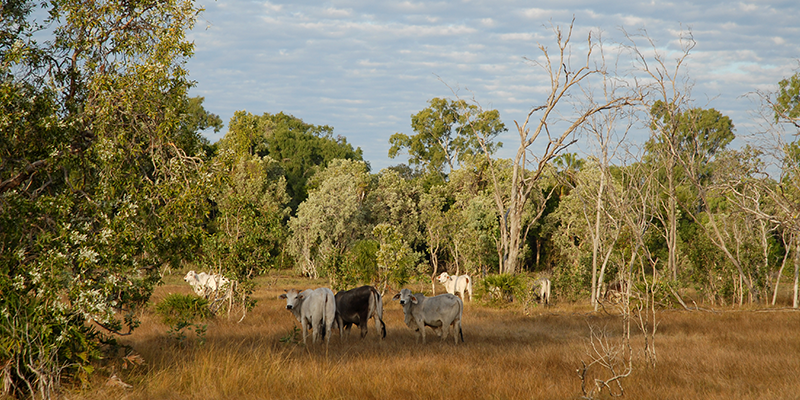
Beef farming is a large portion of Queensland's primary industries
Longreach is a charming outback town located in central Queensland, known for its rich history and heritage. The town is the birthplace of Qantas and is home to the Australian Stockman's Hall of Fame. Longreach offers a relaxed lifestyle with excellent healthcare, education, and community facilities.
Birdsville is a small town located in the heart of the Simpson Desert, known for its famous Birdsville Races and stunning desert landscapes. The town is remote, and living here can be challenging, but for those who love the outdoors and a slower pace of life, Birdsville is an excellent choice.
Cunnamulla is a small town located in southwestern Queensland, known for its natural beauty, rich Aboriginal culture, and historic buildings. The town offers a relaxed lifestyle with excellent healthcare, education, and community facilities. Cunnamulla is also a hub for the wool industry, and there are plenty of opportunities for farming and agribusiness.
Quilpie is a small town located in southwestern Queensland, known for its opals and rich history. The town offers a peaceful lifestyle with excellent healthcare, education, and community facilities. Quilpie is also a hub for the sheep and cattle industries, and there are plenty of opportunities for farming and agribusiness.
Texas exudes a charming small-town allure. Located near the New South Wales border, Texas boasts a rich history and a close-knit community. Known as the "Beef Capital of the North," this tranquil town embraces its agricultural roots, with cattle farming playing a significant role in its economy. Visitors can soak up the peaceful ambiance as they explore the streets lined with charming country-style buildings.
Up North
Living life "up north" in the top end of Queensland is a particular experience that offers a tropical lifestyle with stunning natural beauty, rich culture, and an array of outdoor activities.
Cairns, located in tropical North Queensland, is a paradise for nature lovers and adventure seekers. From the stunning natural beauty of the Great Barrier Reef to the lush rainforests of the Daintree National Park, there's no shortage of outdoor activities to enjoy. But that's not all - Cairns is also a cultural hub, with a vibrant arts scene and a rich indigenous heritage to explore. And let's not forget the amazing food! From fresh seafood to delicious tropical fruits, the local cuisine is a feast for the senses. Plus, with a growing economy and excellent infrastructure, Cairns offers a great quality of life for both families and young professionals. There's really no place quite like it!
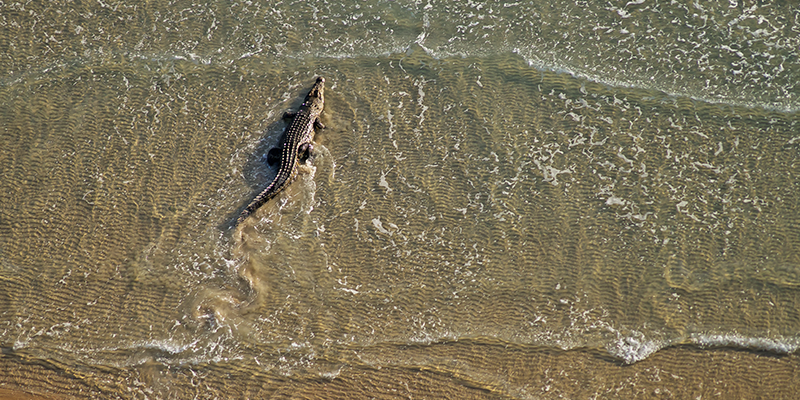
There are many places in the top end of Queensland where you can not swim
Further north, up to Cape York, imagine waking up every day to the stunning beauty of untouched landscapes in one of Queensland's most remote regions. Cooktown and Weipa are just a couple of the towns where you can experience this unique lifestyle, and it's unlike anything you've ever experienced. The relaxed, laid-back lifestyle here is like no other, and residents can easily get lost in the natural beauty of the area. What's more, you can immerse yourself in the rich culture and history of the indigenous communities that call the Cape home. So if you're looking for a life-changing experience, the Cape is the place to be.
One of the main benefits of living in the top end of Queensland is the tropical climate, where residents can enjoy warm weather all year round. The region also offers plenty of opportunities for outdoor activities, including swimming, snorkelling, fishing, camping, and hiking. The top end of Queensland is also known for its diverse wildlife, including kangaroos, wallabies, crocodiles, and sea turtles.
However, living in the top end of Queensland does come with its challenges. The tropical climate can bring severe weather, including cyclones and floods. The remote location of many towns in the region can also mean limited access to healthcare and other essential services.
Finding a home in Queensland
Finding a home in Queensland to move into from interstate can be a daunting task, but with some research and planning, the process can be relatively straightforward. There are several factors to consider when looking for a home in Queensland, including location, budget, and your individual needs and preferences.

Finding the right home in South East Queensland can be a challenge without research
One of the first steps in finding a home in Queensland is to research the different regions and towns throughout the state. Each area offers its unique lifestyle and amenities, and it's essential to find the place that best suits your needs and preferences. You may want to consider factors such as access to healthcare, education, public transport, and outdoor activities when selecting a location.
Once you have identified the region or town you want to live in, you can start looking for suitable properties. Many real estate websites list properties for sale or rent in Queensland, allowing you to search based on your budget, location, and other preferences. You can also consider working with a local real estate agent who can help you find properties that meet your needs.
Once you have found a property that meets your needs and preferences, you will need to go through the process of purchasing or renting the home according to the local laws of Queensland and the area you are moving to. This may involve working with a solicitor or conveyancer to navigate the legal requirements, such as contracts and transfer of ownership.
The cost of buying in the Southeast corner
The cost of buying a home in the Southeast corner of Queensland can vary depending on several factors, including location, size, and condition of the property. Overall, the region is known to have a strong housing and real estate market, with high demand and limited supply contributing to the cost of property. The region is home to several major cities, including Brisbane and the Gold Coast, as well as numerous beachside and hinterland towns that offer a desirable lifestyle.
Accessibility is also a significant factor contributing to the demand for housing in the region. The Southeast corner of Queensland has excellent transport links, including major highways, airports, and public transport, making it easy for residents to travel within the region and beyond.
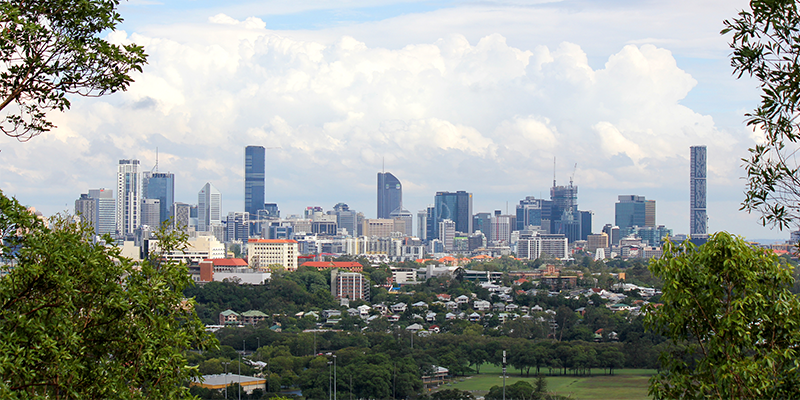
The southeast corner of Queensland is the most densly populated area of the state
The cost of buying a home in the Southeast corner of Queensland can be relatively high, especially in popular areas such as the Gold Coast and Sunshine Coast. However, the region also offers a range of affordable housing options, including apartments and townhouses, in more suburban areas.
One of the benefits of buying a home in the Southeast corner of Queensland is the access to amenities and services. The region is home to numerous schools, healthcare facilities, shopping centres, and recreational areas, making it an ideal location for families.
However, there are also some potential downsides to consider when buying a home in the Southeast corner of Queensland. The high demand for housing can lead to competitive bidding and a lack of available properties, which can make it challenging to secure your desired home. Additionally, the region is known to experience periods of high humidity, low rainfall and extreme weather conditions, which can impact the liveability of some areas.
Buying a home in the Southeast corner of Queensland can be a smart investment, but it's essential to consider the costs, demand, and accessibility of the region before making a purchase. Working with a local real estate agent can help you navigate the housing market and find the perfect home to suit your needs and budget.
Renting
Renting a property in the Southeast corner of Queensland is a popular option for those who are not yet ready to buy or prefer the flexibility of renting. The region offers a range of rental options, including houses, apartments, townhouses, share-houses, boarding houses, and student accommodation.
Houses for rent in the Southeast corner of Queensland are typically in high demand, especially in more popular areas such as the Gold Coast and Sunshine Coast. The cost of renting a house can be relatively high, but there are also more affordable options available in suburban areas. Renting a house can offer more space and privacy than other rental options, making it an ideal choice for families or those who prefer a quieter living environment.
Apartments and townhouses are also popular rental options, especially in more urban areas such as Brisbane. These types of properties can offer a more convenient location and access to amenities such as public transport, shopping centres, and recreational facilities. Renting an apartment or townhouse can be more affordable than renting a house, but it can also mean sacrificing some space and privacy.
Share houses and boarding houses are common rental options for students or those on a tight budget. These types of properties typically offer shared living spaces and bedrooms, with communal kitchens, bathrooms, and living areas. While they can be an affordable option, they may not offer the same level of privacy or comfort as other rental options.
Student accommodation is also available in the Southeast corner of Queensland, with many universities and colleges offering on-campus accommodation options. These can be a convenient choice for students, offering proximity to campus and access to facilities such as study spaces, gyms, and social areas.
One of the advantages of renting is the variety of housing options available. There is something to suit every lifestyle and budget, from affordable apartments and townhouses to luxurious homes with ocean views. The region also offers a range of rental terms, including short-term leases, which can be ideal for those who are not yet sure about their long-term plans.
Renting a property in the Southeast corner of Queensland can also be an excellent way to access desirable locations without the financial commitment of buying. For example, renting a beachside apartment or a townhouse in the heart of the city can provide access to all the amenities and services that the region has to offer.
However, there are also some potential downsides to consider when renting a property in the Southeast corner of Queensland. One of the challenges can be finding the right property in a competitive rental market, particularly in popular areas such as the Gold Coast and Brisbane.
Another potential issue with renting is the lack of control over the property, with some landlords or property managers having strict rules or restrictions that tenants must follow. Additionally, renters may be subject to periodic inspections, which can disrupt their lifestyle or privacy.
Renting can be an excellent way to experience the region's lifestyle and amenities without the commitment of buying. If you're looking for a share-house near the city or a family home in the suburbs, the region offers a range of rental options to suit every need and budget.
Short-stay accommodation
Utilising short-stay accommodation when first moving to Queensland from interstate can offer several benefits. It can provide a temporary home while you search for a more permanent rental or purchase, giving you time to explore different areas and get a feel for the region. Short-stay accommodation can also be more flexible than traditional rental options, with shorter lease terms and the ability to move in quickly. This can be particularly helpful if you need to start work or settle into your new surroundings quickly. Additionally, short-stay accommodation can offer a range of amenities and services, such as cleaning and concierge services, that can make the transition to a new home easier and more comfortable.
Costs of moving to Queensland from …
To get a quote for your own circumstances visit Muval's Moving House Estimator
How to get to Queensland
Plane
Buckle up, folks, and get ready for an exciting adventure. Moving to Queensland from interstate by plane is a thrilling experience. The moment you step off the plane, the warm tropical air will hit you, and you'll feel like you're on vacation. The sights and sounds of this beautiful state will make your heart skip a beat. From the vibrant cityscape of Brisbane to the sun-drenched beaches of the Gold Coast, there's no shortage of breathtaking views.
As you travel by plane, you'll soar over the Great Barrier Reef, a natural wonder that is unlike anything you've ever seen before. You'll catch glimpses of the lush rainforests and majestic mountains that make Queensland such a unique and special place. As you land and begin to explore, you'll discover the friendly locals who are always ready to welcome you with a smile and a helping hand. Whether you're moving to the bustling city or the laid-back coastal towns, you're sure to find a new home that fits your lifestyle perfectly.
So why not take the plunge and experience all that Queensland has to offer? The journey may be long, but the destination is well worth it. Hop on that plane and get ready for the adventure of a lifetime!
Link Airways
Jetstar
Qantas Airways
Virgin Australia
Regional Express
Bus
Moving to Queensland from interstate by bus can be an affordable and stress-free option for those who don't want to drive themselves. With many bus companies offering routes from major cities such as Sydney and Melbourne, it's easy to find a trip that suits your needs. However, it's important to factor in the cost of tickets, which can vary depending on the time of year and demand. Logistical challenges can also arise, such as limited luggage space and longer travel times compared to flying or driving. But, the opportunity to take in the scenic route and appreciate the beauty of the country can make the journey worthwhile.
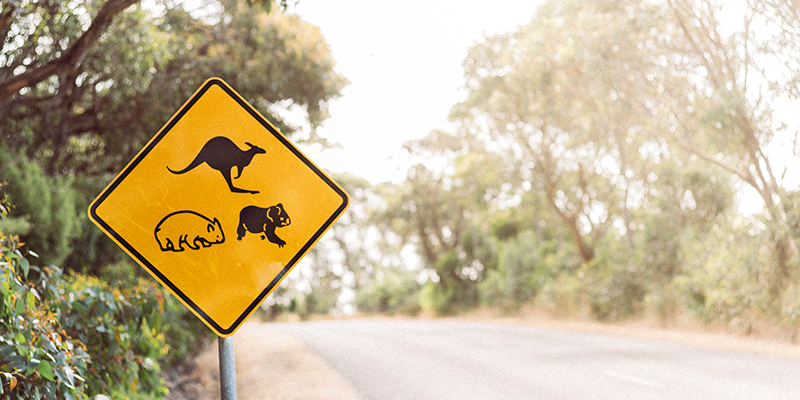
There are many scenic routes into Queensland
Greyhound Australia
Murrays Coaches
Coach Link
Train
Moving to Qld from interstate by train is not only a convenient way to travel but also a great opportunity to explore the stunning landscapes of Australia. Departing from Melbourne, the train ride takes you through picturesque countryside vistas and mountain ranges before arriving in Sydney. Along the way, you can marvel at the beauty of the Great Dividing Range, rolling green hills, and vast open spaces. From Sydney, the train journey continues northward through the heart of New South Wales (NSW), with stunning coastal views, towering cliffs, and sweeping valleys.
If you're departing from Adelaide, the train takes you through the scenic Flinders Ranges and along the coast of the Spencer Gulf. You'll witness the stark beauty of the Australian Outback, and the rich agricultural lands of South Australia. From there, the train travels through the arid Red Centre, passing through Alice Springs and on to Darwin. You can expect breathtaking views of the rugged terrain, vast open spaces, and unique flora and fauna.
The train journey from Perth to Queensland takes you through the heart of Western Australia and into the Northern Territory. Along the way, you'll see the vast expanses of the Nullarbor Plain, the stunning beaches and rugged coastline of WA, and the rolling hills and vineyards of the Barossa Valley. The journey continues through the Red Centre, with its ancient landscapes and unique wildlife.
Traveling by train from Darwin to Queensland offers an incredible opportunity to explore the Top End of Australia. The train journey takes you through the vast wilderness of the Northern Territory, with its rugged terrain, stunning waterfalls, and diverse wildlife. You'll also pass through the heart of the Outback, with its unique landscapes and vibrant Indigenous culture.
In addition to the stunning landscapes, train travel also offers the opportunity to relax, unwind and enjoy the journey. With comfortable seats, onboard dining options, and knowledgeable staff, the train journey to Queensland is an experience to be savoured. Whether you're traveling solo, with friends or family, train travel is a convenient and enjoyable way to arrive in the Sunshine State.
Car - Scenic routes to take to Queensland …
Embarking on a road trip from interstate to Queensland can be an exciting adventure that allows you to explore the diverse and breathtaking landscapes of Australia's north east and coast. As you cross the border and enter the Sunshine State, you'll be greeted by rolling hills, vast plains, and sweeping coastal vistas. Along the way, you'll have the opportunity to stop and explore charming towns like Byron Bay, Coffs Harbour, and the Gold Coast, all of which boast stunning beaches, bustling nightlife, and an array of attractions to explore. As you continue your journey north, you'll be rewarded with the chance to immerse yourself in the rugged beauty of the Queensland outback or soak up the tropical vibes of the far north. Whether you're driving solo, with friends or family, the journey to Queensland by car is a fantastic way to experience the best of what Australia has to offer.
When it comes to people moving to Queensland from interstate, traveling by car can be an exciting and adventurous way to do it. While it can take longer than flying, the journey can be just as enjoyable as the destination. Of course, there are costs to consider, including fuel, food, and accommodation along the way. It's important to factor in the wear and tear on your vehicle, as well as any potential unexpected expenses like breakdowns or flat tires.
One of the best ways to save money on food is to pack a cooler with snacks and drinks, so you can avoid pricey convenience stores and fast-food restaurants. As for accommodation, camping or staying in budget motels can be a great way to keep costs down, but be sure to factor in the cost of camping equipment or sleeping bags if you don't already have them.
It's also important to remember that driving long distances can take a toll on your vehicle, so be sure to get it serviced before you hit the road. Unexpected expenses can arise, so it's always a good idea to have a little extra money set aside just in case. But overall, traveling by car can be an incredible way to explore the beauty of the Australian landscape and create unforgettable memories on your journey to Queensland.
Thrifty
Avis
Budget
Hertz
Europcar
Popular Driving Routes to Queensland
Sydney - The Pacific Coast Touring Route, will take you through some of the most picturesque towns and landscapes in the country. From stunning beaches and lush rainforests to charming towns and bustling cities, you'll see it all along the way.
Melbourne - If you're looking for a scenic drive to Queensland from Melbourne, the Great Alpine Road is a must-see. This winding road takes you through some of the most breathtaking scenery in Australia, including the Alpine National Park and Mount Buffalo National Park. As you travel along the road, you'll pass through charming towns and villages where you can stop for a meal or a coffee. Once you cross the border into Queensland, you'll be greeted by even more stunning landscapes.
Adelaide - The Great Inland Way takes you through some of Queensland's most iconic destinations, including the charming country town of Cunnamulla, famous for its rodeo and friendly locals. You'll also pass through Longreach, home to the Australian Stockman's Hall of Fame and the Qantas Founders Museum, which are must-sees for history buffs. The drive ends in the vibrant tropical city of Townsville, where you can soak up the sun and enjoy the relaxed lifestyle of Queensland.
Perth - If you're looking to move to Queensland from WA, why not make a road trip out of it? One of the most popular tourist drives from Perth to Queensland is the Great Western Woodlands Drive. You'll pass through some of the most stunning landscapes Western Australia has to offer, including vast forests, rolling hills, and wide-open plains. As you make your way towards the Queensland border, you'll have plenty of opportunities to stop and explore charming country towns and unique natural landmarks. One highlight of the Great Western Woodlands Drive is the gold rush town of Kalgoorlie. Take a detour and spend a day exploring this historic town, which is home to some of the country's largest gold mines. From there, you'll head south east towards the Nullarbor Plain, where you'll be treated to breathtaking views of the Great Australian Bight. As you cross the border into South Australia, make sure to stop and stretch your legs at one of the many roadside attractions along the way, including the iconic "Big Kangaroo" in Border Village.
How to move to Queensland - a checklist
Cost of living and housing: When moving to a new city there are various costs you need to take into consideration. Firstly, the cost of moving really does depend where you are moving form and to and what you are moving. Then you need to consider the cost of living, and while the cost of living in Queensland is generally affordable, housing prices vary depending on the location, but many areas offer a range of affordable options, from apartments to houses.
Job market: Queensland has a diverse economy with strong industries such as tourism, mining, agriculture, and healthcare. There are plenty of job opportunities across a range of industries, and the state's low unemployment rate is a testament to its strong economy and thriving job market.
Transportation options: Queensland offers various transportation options, including buses, trains, taxis, and ride-sharing services. The state's major cities also have extensive public transportation systems, making it easy for residents to get around.
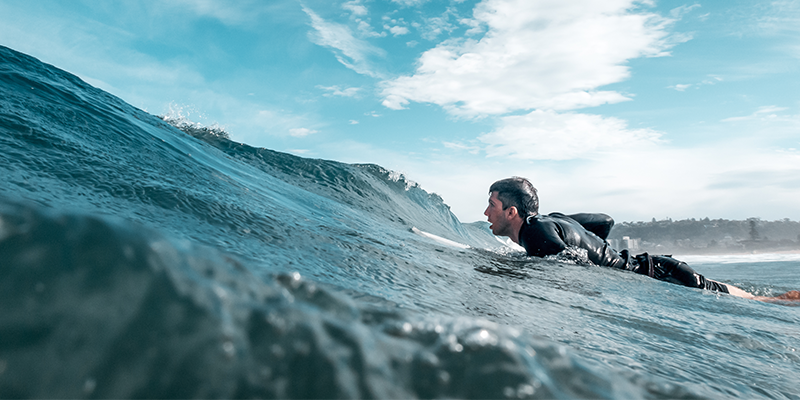
There are iconic beaches all the way up the Queenland coastline
Climate: Queensland is known for its sunny, tropical climate, which is ideal for those who love outdoor activities. Summers can be hot and humid, but the state's coastal regions provide plenty of opportunities to cool off with a refreshing swim.
Neighbourhoods: From bustling city centres to quiet suburban streets, Queensland offers a range of neighbourhoods to suit different lifestyles. Whether you're looking for a family-friendly community or a vibrant, urban atmosphere, there is a neighbourhood in Queensland to suit your needs.
Education and childcare: Queensland has a strong education system, with a range of options for both primary and secondary education. The state also offers various childcare options, including daycares and after-school care programs.
Healthcare options: Queensland has a well-established healthcare system, with public and private hospitals and clinics located throughout the state. Residents can access a range of medical services, including general practitioners, specialists, and emergency care.
Cultural attractions: Queensland is home to a range of cultural attractions, including museums, art galleries, and theatres. The state is also known for its vibrant music and arts scene, with plenty of festivals and events taking place throughout the year.
Local laws and regulations: Queensland has its own set of laws and regulations, which residents must follow. These include rules around driving, smoking, and alcohol consumption. It's essential to be aware of local laws and regulations to avoid any legal issues while living in the state.
> Find an interstate removalist
> Muval Moving Guide
> The Ultimate Moving Boxes Price Guide
> What is a Cubic Metre?
> Moving House Checklist - Change of Address
> How to Safely Pack Your Artwork for Your Move
After you move
Connecting utilities is an important step after moving to Queensland. Setting up your electricity, gas, and water accounts will ensure that you have access to the essentials right from the start. Don't forget to also organise internet and phone services, as they will be essential for keeping in touch with friends and family. Changing your address everywhere is another crucial step in settling in. Make sure to update your details with your bank, superannuation fund, and other important services so that you don't miss any important information.
Researching your local area is a great way to start exploring your new home. Check out local attractions, restaurants, and shops to get a feel for the community. If you're moving for work, research the area around your workplace to find out where you can grab lunch or enjoy a drink after work. Registering your pets with your local council is also important, as it ensures they are properly registered and can be returned to you if they ever get lost.
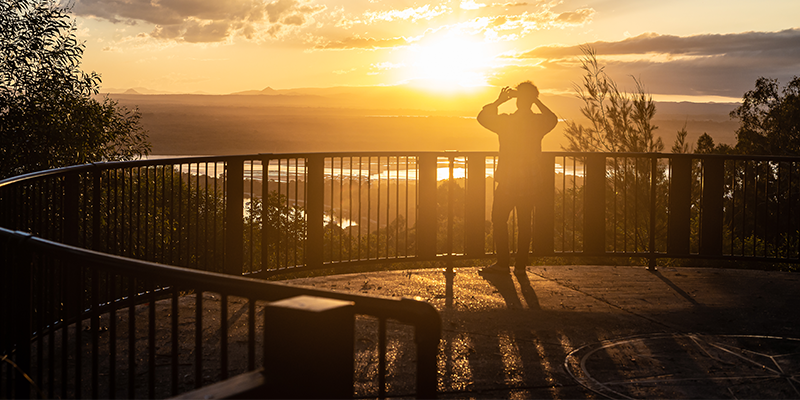
There are plenty of natural attractions to see in Queensland
Understanding the traffic rules, drivers licence and car registration requirements in Queensland is essential if you plan on driving. Make sure to familiarise yourself with the local road rules and obtain a Queensland drivers licence and vehicle registration if necessary. Understanding the state health system and finding new healthcare professionals is also important. Researching new doctors, dentists, and allied health professionals in your area will ensure you can access quality healthcare when you need it.
Finally, don't forget to find your new happy place. Whether it's a local park, beach, or cultural attraction, discovering the things that bring you joy in your new community will help you feel more connected and settled. So get out there and explore - you never know what hidden gems you might discover!
> Moving interstate? Car registration and drivers’ licence essentials
Working and living in Queensland
Living and working in Queensland offers an array of lifestyle options that cater to different preferences. In the southeast corner suburbs, you can enjoy the convenience of city living while still having easy access to beautiful beaches, parks, and nature reserves. Brisbane city boasts a vibrant arts and culture scene, a wide range of shopping and dining options, and a bustling nightlife. The coastal areas, on the other hand, offer a relaxed and laid-back lifestyle, perfect for those who want to spend their days surfing, fishing, or simply soaking up the sun.
If you're looking for a more rural lifestyle, the country and outback regions in Queensland offer a unique and authentic experience. You can enjoy the peace and tranquility of country living while still having access to modern amenities and services. Up north, you'll find a tropical paradise with stunning landscapes, diverse wildlife, and a rich indigenous culture.
The job market in Queensland is diverse, with opportunities in various sectors, including tourism, agriculture, mining, and healthcare. The cost of living and housing varies depending on the location, but overall, it is relatively affordable compared to other states and major Australian cities. The state also has an excellent transportation system, with extensive road networks, public transport options, and regional airports.
Living in Queensland also means being aware of the unique laws and regulations that govern the state. It's important to stay informed about local regulations and to respect the environment and wildlife.
Cost of living in Queensland
Queensland is a state of diverse regions, each offering unique lifestyles and costs of living. The southeast corner suburbs, including Brisbane, are typically more expensive due to the high demand for housing and proximity to city amenities. The coastal areas can also be pricier, especially in popular tourist spots. The country and outback regions tend to have lower costs of living, but fewer job opportunities and limited access to services. Up north, the cost of living can vary depending on the specific location, with some areas being more remote and isolated. Overall, it's important to do your research and consider the lifestyle factors that are most important to you when choosing where to live in Queensland.
Working in Queensland
Working in Queensland can vary greatly depending on the region you are in. The southeast corner and Brisbane city offer a bustling corporate environment, while the coastal areas provide opportunities in hospitality and tourism. The country and outback regions offer work in agriculture and mining, while up north offers opportunities in tropical tourism and remote work. It's important to research the job market in your desired region and be prepared for the unique work culture that each region may offer.
Healthcare
Queensland's healthcare system is well-regarded and offers a range of services throughout the different regions. Major state-run hospitals can be found in locations such as Brisbane, Gold Coast, Townsville, Cairns, and Rockhampton. These hospitals provide a broad range of medical services, including emergency care, specialist consultations, and surgeries. The healthcare system in Queensland is designed to ensure that all residents, regardless of their location, have access to quality medical care. In addition to the large state--run hospitals, there are also numerous private medical facilities throughout the state, providing additional options for those seeking medical treatment.
Churches & religious places
Queensland is a culturally diverse state with many different religious faiths represented. Christianity is the dominant religion, with the largest denominations being Catholic, Anglican, and Uniting Church. Other religions such as Buddhism, Islam, Hinduism, and Judaism are also represented. In the larger cities such as Brisbane, there are places of worship for many different faiths. The smaller towns and rural areas may have fewer options, but there are still communities of people practicing various religions across the state. Overall, Queensland is a tolerant and accepting state where most people are of different faiths can coexist peacefully.
Education in Queensland
Queensland has a diverse range of educational options available for students of all ages and backgrounds. From early childhood education and care to primary and secondary schools, vocational training, and universities, there are numerous pathways for students to achieve their academic and career goals. In addition to the state-run education system, there are also private schools and international education options available. Whether you're looking for a traditional academic program or a more specialised course of study, there are plenty of options to choose from in Queensland.
Pre-School
Queensland offers a range of preschool programs designed to support children's early learning and development, providing them with a foundation for a lifetime of learning. The state government funds and regulates approved preschool programs, which are delivered by various providers, including kindergartens, long day care centres, and community organisations. These programs offer a play-based learning environment that helps children to develop social, emotional, and cognitive skills, preparing them for formal schooling. Preschool programs are available across Queensland, and families can choose the option that best suits their needs and circumstances.
Primary
In Queensland, primary schools follow the Australian Curriculum, which includes English, Mathematics, Science, Humanities and Social Sciences, Health and Physical Education, The Arts, and Technologies. The curriculum is designed to provide students with a solid foundation of knowledge and skills that will prepare them for high school and beyond. Primary schools in Queensland also offer a range of extra-curricular activities such as music, sports, and languages to enhance students' learning experiences.
Secondary
In Queensland, secondary school education typically covers Years 7-12 and follows the Australian Curriculum, which provides a framework for what students should know and be able to do at each stage of their schooling. The curriculum is divided into eight key learning areas, including English, Mathematics, Science, Humanities and Social Sciences, The Arts, Languages, Health and Physical Education, and Technologies. Students are also able to choose from a range of elective subjects to suit their interests and career goals. The curriculum aims to provide students with the knowledge, skills, and understanding to become successful, engaged, and active members of society.
University and tertiary education
Queensland offers a wide range of options for tertiary education, including universities, TAFE institutes, and other higher education providers. There are several universities in Queensland, each with their own areas of specialty and research strengths. The tertiary curriculum is designed to equip students with the knowledge and skills they need to pursue their desired career paths, while also fostering critical thinking, innovation, and problem-solving skills. With a strong emphasis on research, Queensland's tertiary institutions are well-regarded both domestically and internationally, and attract students from all over the world.
Getting around in Queensland
Queensland is a vast and diverse state, but luckily, there are a variety of transport options available to get you where you need to go. Brisbane and the southeast corner of the state have extensive public transport networks, including buses, trains, and ferries. Regional areas are serviced by regional airports, and bus and train services connect many towns and cities. For those wanting to explore further afield, there are plenty of car rental options available.
Driving
Driving around Queensland can be a great way to explore the state's diverse regions, from the tropical north to the arid outback. With well-maintained highways and a range of scenic routes to choose from, it's a popular option for both locals and visitors alike. However, it's important to note that some parts of the state can be remote and require careful planning, especially when it comes to fuel stops and rest breaks. It's also important to familiarise yourself with local road rules, including speed limits, and be mindful of wildlife and other hazards on the road.
> Moving interstate? Car registration and drivers' licence essentials
> The cost of toll roads in your neighbourhood
Explore Queensland
The Queensland holiday – top 5 holiday ideas
Explore the Great Barrier Reef - Queensland is home to the iconic Great Barrier Reef, one of the world's most spectacular natural wonders. Take a tour and dive into the crystal-clear waters to witness the stunning coral formations and the diverse marine life. Snorkeling, scuba diving, and glass-bottomed boat tours are some of the popular ways to explore this underwater paradise.
Relax on the Sunshine Coast - The Sunshine Coast is one of Queensland's most popular holiday destinations, offering miles of pristine beaches, lush hinterland, and a laid-back atmosphere. Take a stroll along the beach, indulge in a spa treatment, or simply soak up the sun by the pool. The region is also home to world-class restaurants, trendy bars, and a thriving arts scene.
Discover the Outback - Queensland's outback is a vast and rugged landscape, rich in natural beauty and cultural heritage. Explore the ancient rock formations, hidden waterholes, and dramatic gorges of the region, or learn about the rich Indigenous history and culture. You can also take a camel ride, attend a rodeo, or camp under the stars.
Experience the Whitsunday Islands - The Whitsunday Islands are a group of 74 islands located in the heart of the Great Barrier Reef. With crystal-clear waters, white sandy beaches, and spectacular coral reefs, the islands are a popular destination for sailing, snorkeling, and diving. You can also take a scenic flight over the islands, or enjoy a luxury spa retreat.
Explore the Daintree Rainforest - The Daintree Rainforest is one of the world's oldest rainforests, home to an incredible diversity of plant and animal life. Take a guided tour and learn about the unique ecosystems, or explore the lush jungle trails on your own. You can also visit the nearby Mossman Gorge, go on a river cruise, or learn about the rich Indigenous culture of the area.
10 essential things you need know about Queensland
Queensland is the second-largest state in Australia, covering 1.85 million square kilometres, with a population of about 5 million people.
Queensland has a subtropical climate with hot summers and mild winters, making it a popular holiday destination all year round.
The Great Barrier Reef, one of the world's natural wonders, is located off the coast of Queensland and can be accessed from various ports along the coast.
Brisbane, Queensland's capital, is the third-largest city in Australia and offers a vibrant culture and entertainment scene.
Queensland is known for its stunning beaches, with some of the most popular ones including Surfers Paradise, Noosa, and the Whitsunday Islands.
The state is home to many national parks, including the Daintree Rainforest, which is the oldest continually surviving tropical rainforest in the world.
Queensland's economy is driven by industries such as agriculture, mining, and tourism, with major exports including coal, beef, and natural gas.
Queensland is a major agricultural producer, particularly in the areas of sugar cane, beef cattle, and tropical fruits.
Queensland is also known for its iconic landmarks, such as the Story Bridge in Brisbane, the Kuranda Scenic Railway, and the Q1 Tower on the Gold Coast.
Sport plays a significant role in Queensland's culture, with many popular events and teams such as the State of Origin rugby league series and the Brisbane Broncos NRL team.
FAQs and fun interesting facts
Location: Queensland is located in northeastern Australia.
Capital City: Queensland's capital is Brisbane.
Size: Queensland is the second-largest state in Australia, covering an area of approximately 1.85 million square kilometers.
Population: The estimated population of Queensland is around 5.2 million people.
Climate: Queensland has a diverse climate, ranging from tropical in the north to more temperate in the south.
Tourist Attractions: Popular tourist attractions in Queensland include the Great Barrier Reef, the Whitsunday Islands, the Daintree Rainforest, the Gold Coast, and the Sunshine Coast.
Swimming: Queensland offers stunning beaches and coastal areas where swimming is safe.
World Heritage Sites: Queensland is home to World Heritage sites such as the Great Barrier Reef, the Wet Tropics of Queensland, and the Daintree Rainforest.
Industries: Major industries in Queensland include tourism, agriculture, mining, and education.
State Flower: The state flower of Queensland is the Cooktown orchid (Dendrobium phalaenopsis).
Whale Watching: Queensland offers fantastic whale watching opportunities during the humpback whale migration.
Famous Islands: Hamilton Island, Fraser Island, and Magnetic Island are among the famous islands in Queensland.
Brisbane to Gladstone Yacht Race: Queensland hosts the annual sailing event known as the Brisbane to Gladstone Yacht Race.
National Parks: Queensland has several national parks, including Lamington National Park, Springbrook National Park, and Girraween National Park.
Best Time to Visit: The best time to visit Queensland depends on the region, but generally, the dry season (winter) from April to October is pleasant for travel.
Great Barrier Reef Exploration: Queensland offers access points to explore the Great Barrier Reef, such as Cairns, Port Douglas, and the Whitsunday Islands.
Unique Wildlife: Queensland is home to unique wildlife species like the platypus, koala, kangaroo, and cassowary.
Australian Outback: Parts of the Australian Outback are accessible from Queensland, especially in the western and central regions.
Festivals and Events: Queensland hosts various festivals and events, including the Brisbane Festival and the Woodford Folk Festival.
Indigenous Culture: Queensland has a rich Indigenous culture, with opportunities to learn about and experience Aboriginal and Torres Strait Islander traditions and heritage.
Don’t forget to see …
You simply cannot visit Queensland without experiencing the breathtaking wonders of the Great Barrier Reef. Snorkeling or diving in this mesmerizing underwater paradise is an absolute must-do! Dive into a world of vibrant coral reefs, colorful fish, and other fascinating marine life. Swim alongside sea turtles, spot playful dolphins, and marvel at the sheer beauty of this UNESCO World Heritage site. Whether you're a seasoned diver or a beginner snorkeler, the Great Barrier Reef offers an unforgettable adventure that will leave you in awe of nature's wonders.
If you're a fan of stunning landscapes and natural wonders, K'Gari (formerly known as Fraser Island) should be at the top of your Queensland bucket list. This magnificent island is the largest sand island in the world and is teeming with unique sights to explore. Take a 4x4 adventure along its sandy beaches and drive through lush rainforests. Don't miss out on the stunning Lake McKenzie, a crystal-clear freshwater lake surrounded by pure white sand. Marvel at the towering sand dunes of the Hammerstone Sandblow or relax in the Champagne Pools, natural rock pools filled with bubbling seawater. Fraser Island is a true gem of Queensland that will leave you spellbound.
For a dose of urban excitement and cultural experiences, make sure to spend some time in vibrant Brisbane. This bustling city offers a perfect blend of modern cosmopolitan living and laid-back charm. Explore the South Bank Parklands, a riverside oasis filled with lush gardens, restaurants, and entertainment venues. Take a stroll through the lively streets of Fortitude Valley, known for its vibrant nightlife and eclectic mix of cafes, bars, and boutique shops. Don't forget to visit the Gallery of Modern Art, showcasing contemporary masterpieces from around the world. Brisbane is a city that will captivate you with its energetic vibe and warm hospitality.
The weather in Queensland
Summer
Summer (December - February): Queensland's summer is known for its hot and humid days, with temperatures averaging around 30°C during the day and remaining warm at night. Thunderstorms and heavy rainfall are common, particularly in the afternoons.
Autumn
Autumn (March - May): Autumn in Queensland is milder than summer, with temperatures ranging from 20°C - 27°C during the day and cooler nights. This is the best time to visit if you want to avoid the summer crowds and still enjoy pleasant weather.
Winter
Winter (June - August): Queensland's winter is generally dry and mild, with daytime temperatures averaging around 22°C and cooler nights. It's a great time to explore the outdoors and enjoy the many festivals and events that take place during this time.
Spring
Spring (September - November): Spring in Queensland is warm and sunny, with temperatures ranging from 23°C - 28°C during the day and cooler nights. It's a great time to visit the beaches and enjoy the many outdoor activities that Queensland has to offer.
Pet Relocations
Pet transport to Queensland
Before you embark on your journey, it's essential to check the Queensland Government's official website for the most up-to-date information on pet importation requirements. They'll provide you with all the necessary details about vaccinations, health certificates, and any specific regulations you need to follow. By following these guidelines, you'll help keep your pet healthy and happy while complying with Queensland's rules. So, whether you're moving from interstate or overseas, rest assured that the Queensland Government has got your pet relocation needs covered!
> Room by Room guide for Pet Proofing When You Move House
> Tips for moving house with pets
Need storage in Queensland?
When planning your interstate removal, Queensland makes it super easy for you to stash away your stuff while you sort things out. With a huge amount of options available, you'll definitely find the perfect storage solution to suit your needs. Weather it's short term storage you need, or long term storage.
> Self Storage Tips and Tricks: Save Time and Money
First things first, take an overall assessment of what you need to store. Are you a collector of quirky antiques or just have way too many winter jackets for the Aussie weather? Whatever it is, figure out how much space you require. Then, hop online and check out the numerous storage providers in Queensland.
Australians are known for being friendly and helpful, right? Storage providers in Queensland definitely live up to that reputation. They understand that your belongings are important to you, so they'll go the extra mile to ensure everything is stored securely. Don't be afraid to ask questions and discuss any concerns you may have. The staff will happily guide you through the process and help you find the ideal storage solution.
Share this page on Facebook
Moving house starts here
View pricing, read reviews and book professional interstate and local removalists online.